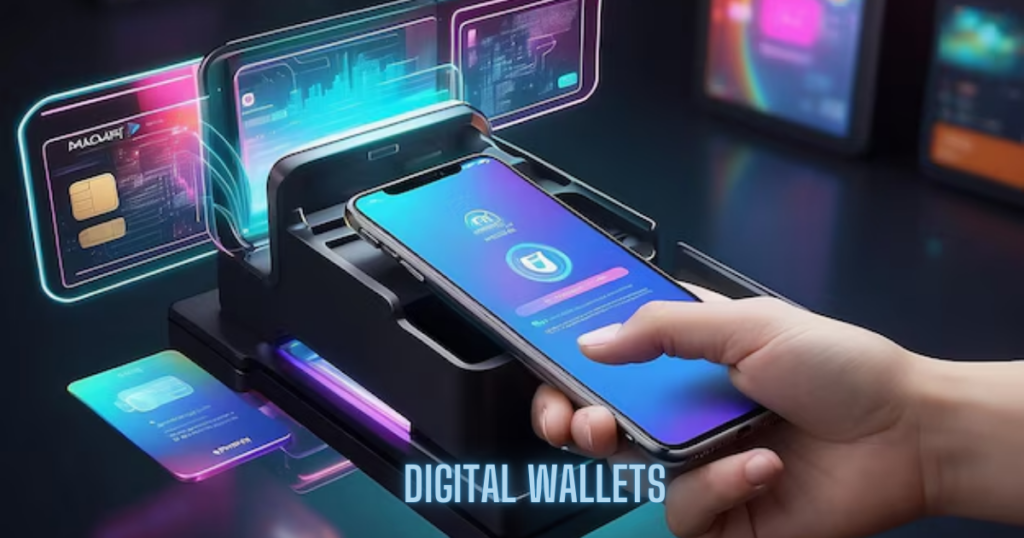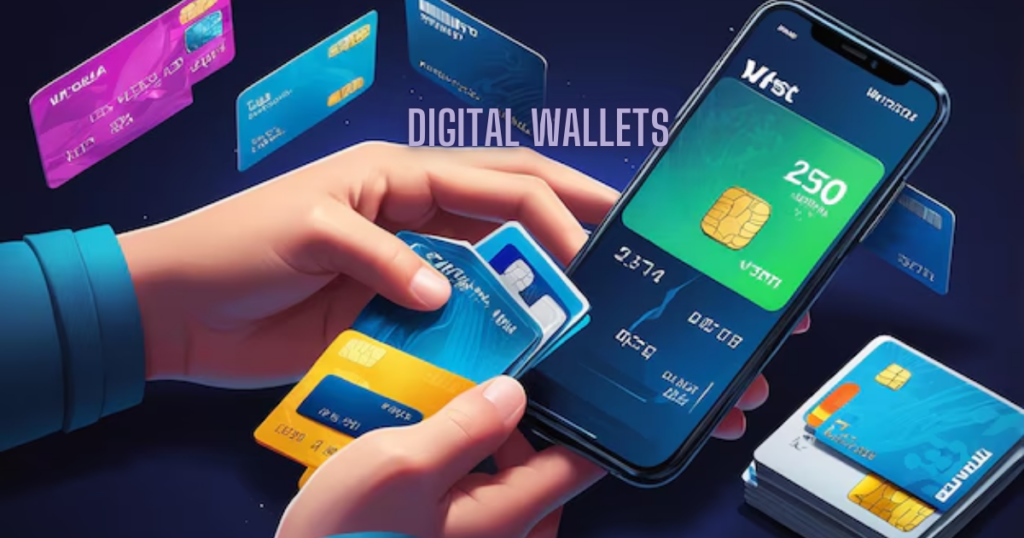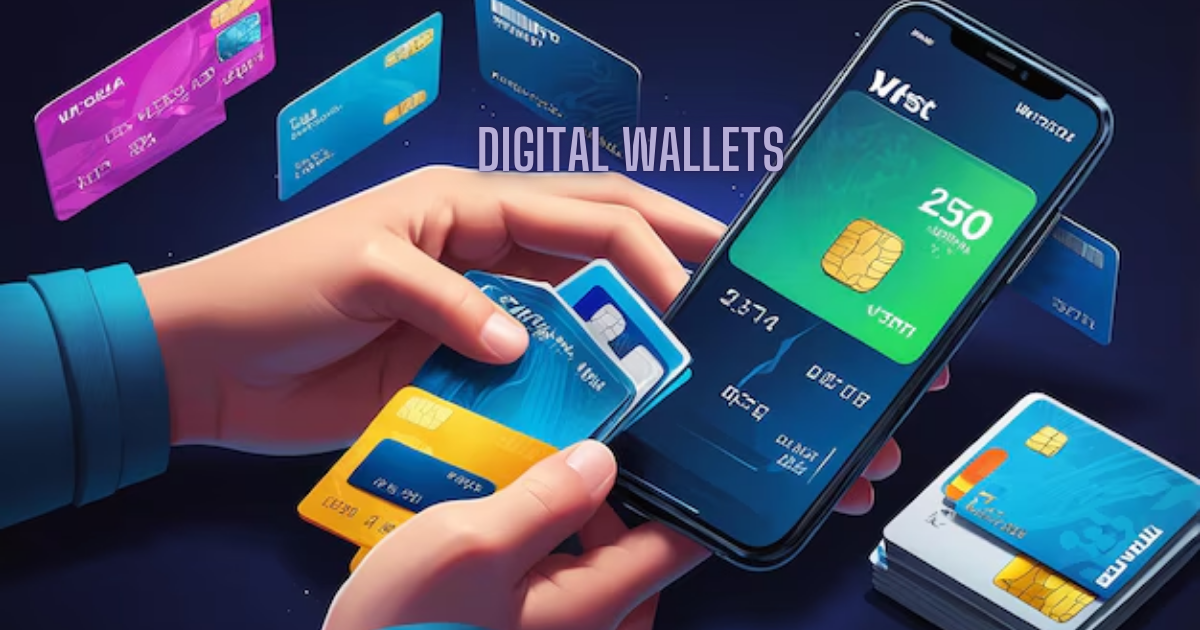Introduction:
In 2024, digital wallets are transforming how we handle money. With the rise of mobile payments, people are moving away from cash and credit cards. Digital wallets allow you to store payment information securely and make transactions with a few taps on your smartphone. This trend is booming worldwide, driven by convenience and security.

Mobile payments aren’t just a tech fad—they’re reshaping the finance world. In this article, we’ll explore why digital wallets are a game-changer and how they are shaping today’s financial landscape.
- What Are Digital Wallets?
- Why Are Digital Wallets Popular?
- Digital Wallets-Impact on Traditional Banking
- Digital Wallet's Role in Financial Inclusion
- Are Digital Wallets Safe?
- The Future of Digital Wallets
- How to Set Up a Digital Wallet
- Digital Wallets and Small Businesses
- Digital Wallets and the Environment
- Conclusion: Are You Ready for the Digital Wallet Revolution?
- FAQs about Digital Wallets
- Q1: What exactly is a digital wallet
- Q2: How do digital wallets work?
- Q3: Are digital wallets safe?
- Q4: Can I use a digital wallet without internet access?
- Q5: What are the benefits of using digital wallets over traditional payment methods?
- Q6: Can I use digital wallets for international transactions?
- Q7: How do I set up a digital wallet?
- Q8: Do digital wallets charge fees?
- Q9: Can I use digital wallets with all merchants?
- Q10: Can digital wallets store cryptocurrencies?
- Disclaimer
What Are Digital Wallets?
A digital wallet is a virtual system that stores your payment methods, like credit or debit cards, and allows you to make transactions through apps. The most popular digital wallets today are Apple Pay, Google Pay, and PayPal.
These wallets are secure, easy to use, and allow people to make purchases or send money instantly. The growing popularity of these wallets is changing how businesses and consumers interact.
Why Are Digital Wallets Popular?
Convenience and Speed
Digital wallets make payments quick and simple. You are not required to carry physical cards or cash. Just a smartphone or smartwatch with the wallet app installed is enough. This has made it easier for people to make purchases, whether at the grocery store or online.
Security
Unlike traditional wallets, digital wallets provide an extra layer of security. They use encryption and tokenization to protect your data. This means your card information is not shared during transactions. Even if someone gets your phone, they would still need passwords or biometric verification like fingerprints to access your digital wallet.
Growing Acceptance by Businesses
Businesses, both big and small, are rapidly adopting mobile payments. This trend is increasing, with many retailers now offering discounts for using digital wallets. More companies accepting these payment methods means faster transactions and better customer experiences.
Digital Wallets-Impact on Traditional Banking
Reduction in Card Usage
The use of plastic cards is declining as digital wallets take over. People are finding it easier to link their cards to mobile apps and pay with their phones. This reduces the need to carry multiple cards and also helps in minimizing card fraud.
Rise of Mobile Banking
Mobile banking apps are now integrated with digital wallets, allowing users to manage their money more efficiently. Traditional banks are seeing more people rely on their mobile platforms for all types of banking, from checking balances to applying for loans.
Table: Traditional Cards vs. Digital Wallets
| Feature | Traditional Cards | Digital Wallets |
| Payment Speed | Slower | Instant |
| Security | Risk of card fraud | High encryption security |
| Need for Physical Presence | Yes | No |
| Tracking and Reporting | Manual | Automated |
Digital Wallet’s Role in Financial Inclusion

These are playing a significant role in making financial services accessible to everyone. A number of people in developing countries do not have access to traditional banking. However, they often have mobile phones. By using digital wallets, they can send and receive payments easily.
This is helping to close the financial gap for millions of people worldwide, allowing them to participate in the digital economy without needing a bank account.
Are Digital Wallets Safe?
One concern people often have is the safety of mobile payments. However, digital wallets have built-in security features that make them safer than traditional wallets.
Biometric Authentication
Most digital wallets require biometric verification, like a fingerprint or face scan, to approve a payment. This ensures that even if someone gets hold of your phone, they won’t be able to use it.
Encryption and Tokenization
These use tokenization to replace your card details with a unique identifier. This keeps your actual card information hidden, which protects you from fraud.
The Future of Digital Wallets
Increased Adoption in Everyday Life
In the next few years, digital wallets will likely become the main way people make payments. With new technologies like wearables and smart assistants (e.g., Alexa), it will be easier than ever to pay for things without needing a physical wallet.
Integration with Cryptocurrency
Another trend we are starting to see is the integration of cryptocurrencies into d. wallets. A number of people are using their mobile wallets to store Ethereum, Bitcoin, and other digital currencies. This trend is expected to grow as more businesses start accepting cryptocurrency payments.
Quotes from Industry Experts
To better understand the impact of digital wallets, here’s what some industry leaders are saying:
“Mobile payments are the future of the financial sector. They offer unparalleled convenience and security to users.” Dr. Dinesh Sharma, Director Finance SRP Group
“Digital wallets are empowering people by offering access to financial services, especially in areas where traditional banking is lacking.” Dr. Dinesh Sharma, Director Finance SRP Group
How to Set Up a Digital Wallet
Setting up a digital wallet is easy. Follow these simple steps:
- Choose a Wallet App: Decide which wallet you want to use (Apple Pay, Google Pay, etc.).
- Download the App: Install the app from your phone’s app store and Google store..
- Add Your Payment Method: Enter your credit or debit card details or link your bank account.
- Set Up Security: Activate fingerprint, face ID, or a strong password.
- Start Paying: You can now use your digital wallet at stores, online, or to send money to friends.
Digital Wallets and Small Businesses
Cost-Effective Payments
For small businesses, these offer a cost-effective solution for accepting payments. They require less hardware, and transactions are faster, meaning shorter lines and happier customers.
Better Customer Engagement
Digital wallets also allow businesses to offer rewards and discounts more easily. Many wallet apps allow customers to store loyalty cards or coupons, which improves customer retention.
Digital Wallets and the Environment
Another benefit of digital wallets is their positive impact on the environment. Since they reduce the need for paper receipts and plastic cards, they contribute to less waste. More companies are encouraging the use of digital payments as part of their eco-friendly initiatives.
Conclusion: Are You Ready for the Digital Wallet Revolution?
Digital wallets are here to stay. With their ease of use, security, and growing acceptance by businesses, they are reshaping the financial world. As more people adopt these wallets, they are becoming a central part of modern finance.
If you haven’t tried a it yet, now is the time. The future of money is digital, and it’s right in your pocket.
By adopting digital wallets, both individuals and businesses can benefit from faster, safer, and more efficient transactions. So, are you ready to leave your traditional wallet behind and join the mobile payment revolution?
FAQs about Digital Wallets
Q1: What exactly is a digital wallet
It is a virtual system where you store payment methods, like credit or debit cards, that allows you to make payments online or at stores. It’s an app on your smartphone or other devices that makes transactions fast and secure.
Q2: How do digital wallets work?
These use Near Field Communication (NFC) technology or QR codes to process payments. When you wish to make a purchase, you simply tap your phone or scan a code, and the app securely transfers your payment information.
Q3: Are digital wallets safe?
Yes, digital wallets are generally very safe. They use advanced security measures like encryption, tokenization, and biometric authentication (such as fingerprint or facial recognition). These features add an extra layer of protection that makes them safer than carrying physical cards.
Q4: Can I use a digital wallet without internet access?
In most cases, yes. Many of these store your payment details locally, meaning you can make transactions without an active internet connection. However, for some services, an internet connection might be required for certain features like sending money to others.
Q5: What are the benefits of using digital wallets over traditional payment methods?
Digital wallets offer several benefits:
- Convenience: There is no need to carry cash or cards.
- Security: Encryption and biometric authentication protect your information.
- Faster transactions: Pay with a single tap.
- Rewards and discounts: Many apps offer cashback or rewards for using their service.
Q6: Can I use digital wallets for international transactions?
Yes, these can often be used for international payments, but it depends on the app and the merchant’s acceptance of such payments. Some wallets, like PayPal, are widely accepted internationally, while others may be limited to certain countries.
Q7: How do I set up a digital wallet?
Setting up a digital wallet is easy:
- Download a digital wallet app like Apple Pay or Google Pay.
- Either enter your card details or link your bank account.
- Set up security, like fingerprint or password protection.
- Start using it for payments, both online and in-store.
Q8: Do digital wallets charge fees?
Most of these do not charge fees for everyday transactions like paying in stores or online. However, some may charge fees for sending money or international payments, so it’s essential to check the terms and conditions of your wallet provider.
Q9: Can I use digital wallets with all merchants?
Not all merchants accept digital wallets yet, but the number is growing rapidly. Major retailers, online shops, and even small businesses are starting to accept digital wallet payments, especially as more consumers prefer cashless transactions.
Q10: Can digital wallets store cryptocurrencies?
Yes, many of these are now integrating cryptocurrency options. Some wallets allow users to store, send, and receive digital currencies like Bitcoin and Ethereum. However, these are typically separate from traditional payment options and require additional steps to set up.
Disclaimer
This article relies on internal data, publicly available information, and other reliable sources. It may also include the authors’ personal views. However, it’s essential to note that the information is for general, educational, and awareness purposes only—it doesn’t disclose every material fact. This analysis is for informational purposes only and does not constitute financial advice. Consult a professional before making investment decisions.
We publish information on World Virtual CFO in good faith, solely for general information. World Virtual CFO doesn’t guarantee the completeness, reliability, or accuracy of this information. These are our views for informational purposes. When you use our website, know that any action you take is entirely at your own risk. World Virtual CFO won’t be liable for any losses or damages connected to your use of our website. For detailed information, refer to our disclaimer page.
Dr. Dinesh Sharma is an award-winning CFO and AI strategist with over two decades of experience in financial leadership, digital transformation, and business optimization. As the founder of multiple niche platforms—including WorldVirtualCFO.com—he empowers professionals and organizations with strategic insights, system structuring, and innovative tools for sustainable growth. His blogs and e-books blend precision with vision, making complex financial and technological concepts accessible and actionable.
